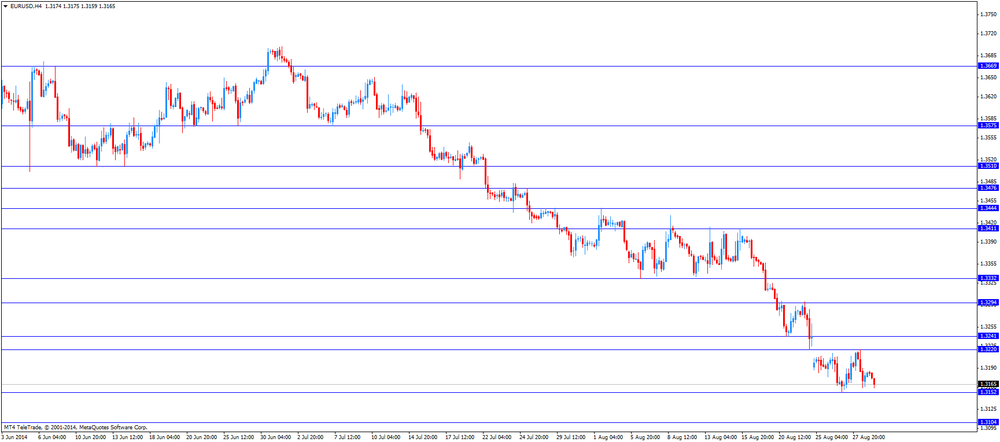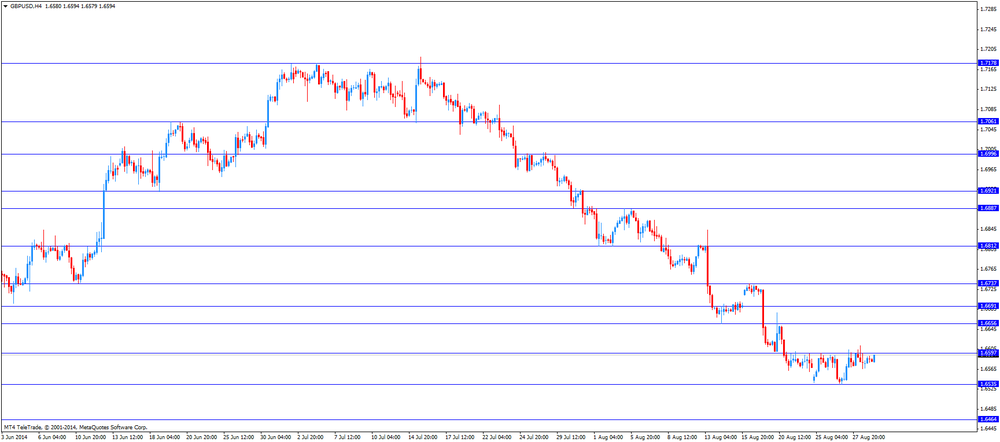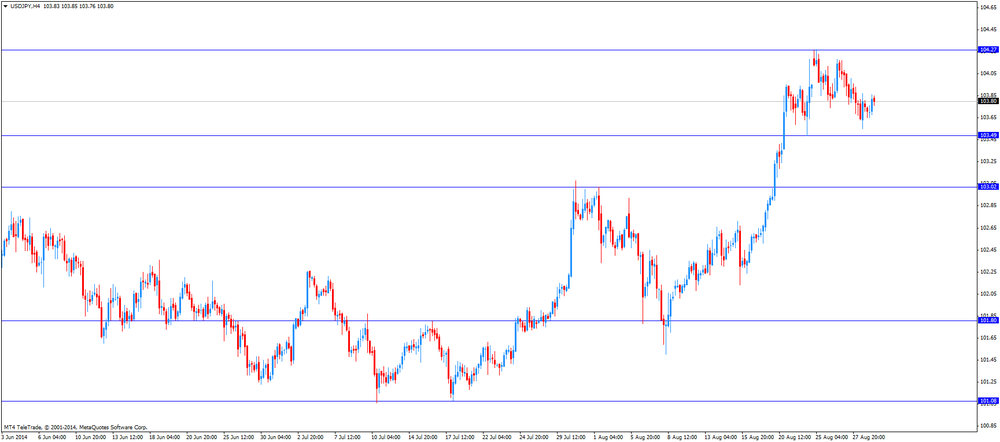- Analytics
- News and Tools
- Market News
- Foreign exchange market. Asian session: the Japanese yen traded slightly lower against the U.S. dollar after mixed economic reports from Japan
Foreign exchange market. Asian session: the Japanese yen traded slightly lower against the U.S. dollar after mixed economic reports from Japan
Economic calendar (GMT0):
(Time/ Region/ Event/ Period/ Previous/ Forecast/ Actual)
01:00 New Zealand ANZ Business Confidence August 39.7 24.4
01:30 Australia Private Sector Credit, m/m July +0.7% +0.5% +0.4%
01:30 Australia Private Sector Credit, y/y July +5.1% +5.1%
05:00 Japan Housing Starts, y/y July -9.5% -10.5% -14.1%
06:00 United Kingdom Nationwide house price index August +0.1% 0.0% +0.8%
06:00 United Kingdom Nationwide house price index, y/y August +10.6% +11.0%
06:00 Germany Retail sales, real adjusted July +1.0% Revised From +1.3% +0.1% -1.4%
06:00 Germany Retail sales, real unadjusted, y/y July +0.4% +0.7%
07:00 Switzerland KOF Leading Indicator August 98.1 97.9 99.5
The U.S. dollar traded mixed to higher against the most major currencies. The greenback was supported by Thursday' better-than-expected U.S. economic data. The U.S. revised gross domestic product jumped 4.2% in the second quarter instead of the previously reported 4.0%. That was the fastest increase since the third quarter of 2013. Analysts had expected an increase of 3.9%.
The number of initial jobless claims in the week ending August 22 fell by 1,000 to 298,000 from 299,000 in the previous week.
The U.S. pending home sales rose 3.3% in July, exceeding expectations for a 0.6% gain, after a 1.3% fall in June. That was the highest level since August 2013.
The New Zealand dollar traded lower against the U.S dollar due to the weak economic data from New Zealand. The ANZ business confidence index in New Zealand fell to 24.4 in August from 39.7 in July. That was the sixth straight decrease in six months.
The total number of building permits in New Zealand rose 0.1% in July, after a 3.5% gain in June.
The Australian dollar traded mixed against the U.S. dollar after the weaker-than-expected economic data from Australia. Private sector credit in Australia increased 0.4% in July, missing expectations for a 0.5% rise, after a 0.7% gain in June.
The Japanese yen traded slightly lower against the U.S. dollar after mixed economic reports from Japan. Japan's national consumer price index (CPI), excluding fresh food, climbed at an annual rate of 3.3% in July, in line with expectations, after a 3.3% gain in June.
Japan's national CPI rose 3.4% in July, after a 3.6% rise in June.
Household spending in Japan dropped 5.9% in July, missing forecasts of a 2.7% decline, after 3.0% decrease in June.
Retail sales in Japan increased 0.5% in July, exceeding expectations for a 0.1% decline, after a 0.6% fall in June.
Japan's unemployment rate rose to 3.8% in July from 3.7% in June. Analysts had expected the unemployment rate to remain unchanged at 3.7%.
Preliminary industrial production in Japan climbed 0.2% in July, missing expectations for a 1.4% rise, after a 3.4% decline in June.
Housing starts in Japan plunged 14.1% in July, missing forecasts of a 10.5% decrease, after a 9.5% drop in June.
EUR/USD: the currency pair fell to $1.3173
GBP/USD: the currency pair traded mixed
USD/JPY: the currency pair rose to Y103.86
The most important news that are expected (GMT0):
09:00 Eurozone Unemployment Rate July 11.5% 11.5%
09:00 Eurozone Harmonized CPI, Y/Y (Preliminary) August +0.4% +0.3%
12:30 Canada Raw Material Price Index July +1.1% +0.7%
12:30 Canada GDP (m/m) June +0.4% +0.3%
12:30 U.S. Personal Income, m/m July +0.4% +0.3%
12:30 U.S. Personal spending July +0.4% +0.2%
12:30 U.S. PCE price index ex food, energy, m/m July +0.1% +0.1%
12:30 U.S. PCE price index ex food, energy, Y/Y July +1.5%
13:45 U.S. Chicago Purchasing Managers' Index August 52.6 56.3
13:55 U.S. Reuters/Michigan Consumer Sentiment Index (Finally) August 79.2 80.4
© 2000-2026. All rights reserved.
This site is managed by Teletrade D.J. LLC 2351 LLC 2022 (Euro House, Richmond Hill Road, Kingstown, VC0100, St. Vincent and the Grenadines).
The information on this website is for informational purposes only and does not constitute any investment advice.
The company does not serve or provide services to customers who are residents of the US, Canada, Iran, The Democratic People's Republic of Korea, Yemen and FATF blacklisted countries.
Making transactions on financial markets with marginal financial instruments opens up wide possibilities and allows investors who are willing to take risks to earn high profits, carrying a potentially high risk of losses at the same time. Therefore you should responsibly approach the issue of choosing the appropriate investment strategy, taking the available resources into account, before starting trading.
Use of the information: full or partial use of materials from this website must always be referenced to TeleTrade as the source of information. Use of the materials on the Internet must be accompanied by a hyperlink to teletrade.org. Automatic import of materials and information from this website is prohibited.
Please contact our PR department if you have any questions or need assistance at pr@teletrade.global.


















